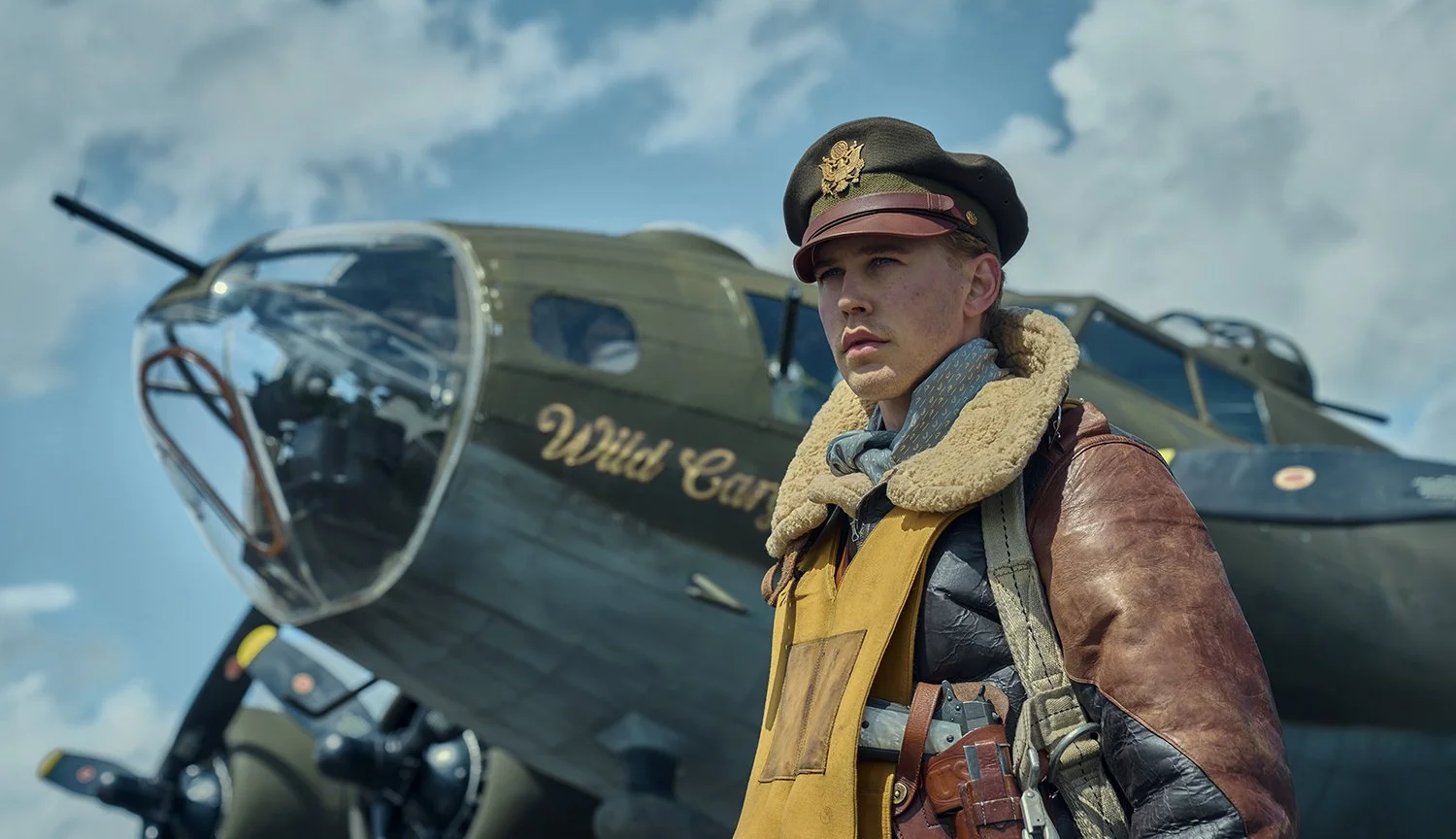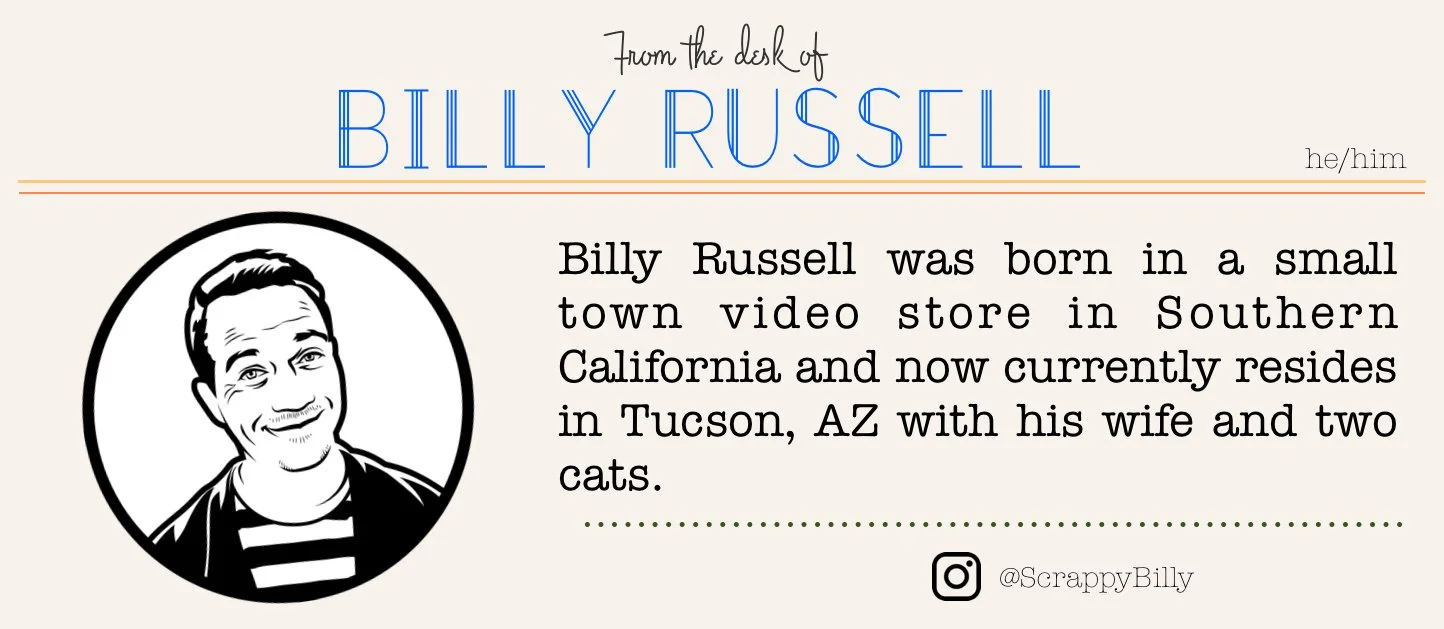MASTERS OF THE AIR holds its own in the landscape of WWII television
by Billy Russell, Staff Writer
Created by John Shiban & John Orloff
Starring Austin Butler, Callum Turner, Anthony Boyle, Barry Keoghan, Nikolai Kinski, Stephen Campbell Moore
All episodes streaming now on Apple TV+
Let me first get this out of the way: Masters of the Air isn’t perfect. In fact, it’s far from it. It’s flawed, it’s a little sloppy, and in only 9 episodes there are loose ends that don’t get tied up and it gets a bit repetitive.
Masters of the Air is also an ambitious miniseries that is epic in scope, intimate in scale, and swings for the fences. More often than not, it knocks whatever message it wants to send sailing out of the park.
Telling the bloody story of the 100th Bomb Group in the Allied bombing campaign of WWII, we follow a colorful cast of pilots, gunners, logistical planners, and governmental bureaucrats as they attempt to win the war through the sky. The vast majority of these missions end with high casualties on the American side. The B-17 Flying Fortresses, as they were called, are gigantic hunks of metal in the sky—slow-moving, easy targets. They hold a massive payload of bombs to completely destroy enemy factories, and, unlike their British counterparts, they don’t run missions at night in order to ensure the utmost precision. Predictably enough, though, they find themselves coming back to base, mission after mission, with friends shot down, MIA or KIA.
As the series progresses, the stakes raise higher and higher. With fewer and fewer pilots surviving these missions, the Air Force designs a new plane: The P-51 Mustang, a game-changer for the airborne war effort. In Masters of the Air, this is how the viewer is introduced to the Tuskegee Airmen, a historic first of Black American pilots who assisted the bombing missions. The P-51 were light and nimble, the most maneuverable things in the sky at the time. They would be able to shoot down German Luftwaffe attack planes. As this technique was refined, more and more pilots made it back to base after their bombing missions were completed.
The horrors of war, as viewed from the sky, have a certain amount of distance between them, to separate them from reality. The action in the sky is horrific, but beautiful. Bullets rips through hulls. Carriages split in half. Bodies spill out, engulfed in flames. It’s horrible to see, but it doesn’t feel real, and the pilots are able to distance themselves from it, in order to keep flying and completing successful campaigns to further the success of the Allied forces.
Everything changes when you’re on the ground, though, and nothing exists to filter the imagery and terror they’re subjected to. Many of the pilots who were shot down navigate their way through enemy-occupied Europe and witness the destructive forces of fascism firsthand. One of them even happens upon an unspeakable evil most American soldiers were completely unaware even existed: An SS death camp for Polish Jews.
Masters of the Air is the third series about WWII following the highly successful Band of Brothers. While Band of Brothers was mostly apolitical, but still firmly anti-Nazi, focusing instead of the brotherhood and bonds between the men that served, Masters of the Air minces no words about how opposed to Nazism it is. While the men in the air, dropping bombs from above, get disillusioned by the amount of death they’re causing or receiving, but in total reality are divorced from, they receive harsh reminders of the reality of the war through the actions of German soldiers, who will murder millions of innocent lives, and commit genocide to further their agenda of so-called superiority.
The young cast of the show are all perfectly cast in their parts. Austin Butler and Callum Turner (as “Buck” and “Bucky” in an underrated little gag) are the heart of the show. Anthony Boyle as Crosby provides the viewer with insight into the logistical, workmanlike math that goes into these missions. Nate Mann as “Rosie” Rosenthal gives life to the missions, in all his self-doubt and surprising courage. Branden Cook plays Lt. Alexander Jefferson of the Tuskegee Airmen, giving nuance to the role of disenfranchised pilot fighting for respect from a country that treats him unfairly.
I was lucky enough to screen most of Masters of the Air on a large TV capable of 4K resolution, HDR and a sound system compatible with its Dolby Atmos mix. The show looks and sounds incredible, with its planes flying into a glistening sun, golden clouds bubbling beneath their wings–all the while the top-firing speakers and pitching engine sounds throughout the ceiling and the subwoofer is rumbling discreetly.
Some of my favorite moments, though, were the quiet ones. Like the episode where Bucky goes on leave, emotionally devastated from a massive loss, and finds and unlikely friendship with a Polish woman who lost her husband. She still doesn’t know if he’s a prisoner somewhere, or dead. It’s not the treacly meeting of wounded souls you would think it to be. They don’t encourage each other while music emotionally swells. Instead, they just allow each other to be damaged in their company, while they indulge their demons and drink and screw and watch bombs fall from the sky onto the city below.
Masters of the Air is receiving mixed reactions from critics. The common theme among the negative reviews is that it’s no Band of Brothers. And that’s true, it isn’t. Band of Brothers was an event. It was Important TV, with a capital I. The miniseries was a groundbreaker in terms of televised storytelling. Masters of the Air is closer in quality to Band of Brothers’ first follow-up The Pacific. The Pacific was, at the time, also subject to mixed reviews because it, too, wasn’t Band of Brothers. It didn’t focus on the bonds between men or finding hope in a hopeless situation. It was dedicated to showing the harrowing realism of the Pacific Theater of Operations and pulled zero punches in recreating what the Marines went through. It almost felt like an anti-Band of Brothers. This wasn’t a story about friendship—it was about hell on earth.
And so, Masters of the Air is receiving the same criticism. I think in a few years, the show will be reevaluated, and its reception will be more welcoming (probably raised to the status The Pacific now enjoys years after it aired), particularly because many of the complaints lobbed at the show are referring to its first episodes, which lay a lot of groundwork to pay off later. Masters of the Air is a show that slowly builds and builds to a fantastic climax of excitement, action, and emotion. The final episode is a masterpiece in the streaming era.


